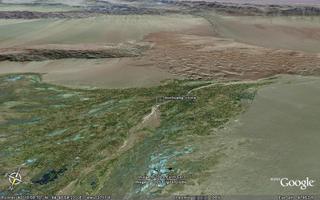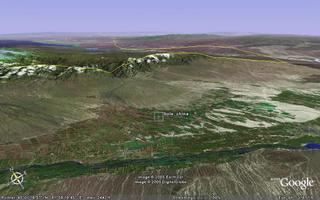Part 2: Beijing - Xian
At the Beijing train station (the date now is July 29, 2005) I reunited with David Crane and Becky Nolin, and met up with the newly arrived John Henry and Jess Davis (also of Davidson), as well as Bill Dixon, an engineering student at Boston University. It was great to see David and Becky again after more than a month living by myself in Taipei. Just hours after arriving, all six of us boarded a sleeper train for the city of Xi'an. We had great beds and the time went by without us noticing it.
In the morning we woke up to find ourselves in Xi'an, famous for its city wall and the thousands of terracotta warriors buried during the short-lived, magnificent, and brutal Qin dynasty (the first and only Qin emperor also began construction of the great wall). In Xi'an we also visited a large and famous mosque built in the 1400s. The further west we traveled, the less people we met who were not Muslim. In Xi'an we also experienced the infamous "Chinese do not respect lines" problem, whereby people in China (unlike in Taiwan or Hong Kong) refuse to line up for anything, and just push as hard as they can to the front. As we were boarding a bus, we had to push our way through a screaming, kicking crowd. It was unbelievable.
We did not stay the night in Xi'an. Instead, we boarded an overnight train to the desert city of Dunhuang in Gansu province. Unfortunately, there were no sleeper cars left, and so we sat -- and slept -- in the regular seats. For 28 hours. It was pretty miserable, but somehow it didn't bother us that much; we were in a really good mood and having a good time. The scenery outside was sort of rocky desert, but sometimes it was really beautiful, lush green fields. Everyone else sitting on the train with us was very poor, some were Muslim. Everyone started at us -- for the whole trip. The staring can seem unfriendly at first, but if you talk to someone, they usually laugh and get excited, and you understand that they're not hostile -- they really are just curious. That being said, the policeman on the train did warn us to watch our bags closely and find him if we had any trouble. The Chinese police may work for a communist government with a history of unmitigated oppression and brutality, but it must be said that throughout the trip, a Chinese cop anywhere was someone we could depend on for efficient and honest help. They know that foreign tourists have to be protected and looked after -- we bring a lot of money to these far-away western towns and cities. Finally, exhausted, (only having sort-of-slept) we arrived in Dunhuang.


